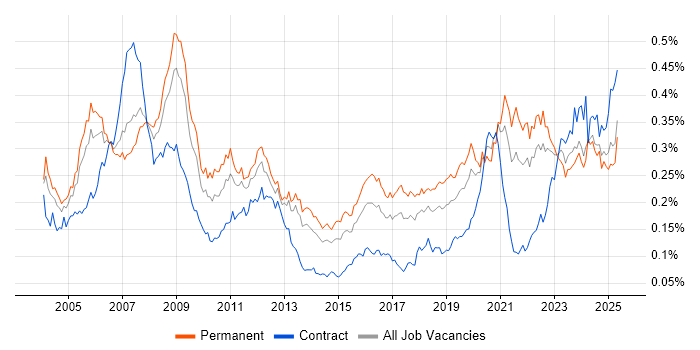Field-Programmable Gate Array (FPGA)
UK > UK excluding London
The table below looks at the prevalence of the term FPGA in permanent job vacancies in the UK excluding London. Included is a benchmarking guide to the salaries offered in vacancies that cited FPGA over the 6 months leading up to 28 May 2025, comparing them to the same period in the previous two years.
| 6 months to 28 May 2025 |
Same period 2024 | Same period 2023 | |
|---|---|---|---|
| Rank | 482 | 546 | 596 |
| Rank change year-on-year | +64 | +50 | +25 |
| Permanent jobs citing FPGA | 89 | 226 | 163 |
| As % of all permanent jobs advertised in the UK excluding London | 0.23% | 0.31% | 0.28% |
| As % of the Miscellaneous category | 0.67% | 0.93% | 0.66% |
| Number of salaries quoted | 49 | 161 | 78 |
| 10th Percentile | £37,500 | £32,500 | £39,388 |
| 25th Percentile | £50,000 | £39,750 | £41,250 |
| Median annual salary (50th Percentile) | £61,500 | £50,000 | £60,000 |
| Median % change year-on-year | +23.00% | -16.67% | -14.29% |
| 75th Percentile | £72,000 | £65,000 | £82,500 |
| 90th Percentile | £78,000 | £75,000 | £85,750 |
| UK median annual salary | £62,500 | £51,500 | £60,000 |
| % change year-on-year | +21.36% | -14.17% | -14.29% |
All Generic Skills
UK excluding London
FPGA falls under the General and Transferable Skills category. For comparison with the information above, the following table provides summary statistics for all permanent job vacancies requiring generic IT skills in the UK excluding London.
| Permanent vacancies with a requirement for generic IT skills | 13,271 | 24,318 | 24,624 |
| As % of all permanent jobs advertised in the UK excluding London | 34.13% | 33.02% | 42.18% |
| Number of salaries quoted | 5,777 | 15,252 | 11,013 |
| 10th Percentile | £28,500 | £26,250 | £31,250 |
| 25th Percentile | £36,925 | £35,000 | £40,625 |
| Median annual salary (50th Percentile) | £55,000 | £50,000 | £55,000 |
| Median % change year-on-year | +10.00% | -9.09% | +4.76% |
| 75th Percentile | £67,500 | £65,000 | £70,000 |
| 90th Percentile | £80,000 | £78,750 | £85,000 |
| UK median annual salary | £60,000 | £55,000 | £65,000 |
| % change year-on-year | +9.09% | -15.38% | +4.00% |
FPGA
Job Vacancy Trend in the UK excluding London
Job postings citing FPGA as a proportion of all IT jobs advertised in the UK excluding London.

FPGA
Salary Trend in the UK excluding London
3-month moving average salary quoted in jobs citing FPGA in the UK excluding London.
FPGA
Salary Histogram in the UK excluding London
Salary distribution for jobs citing FPGA in the UK excluding London over the 6 months to 28 May 2025.
FPGA
Job Locations in the UK excluding London
The table below looks at the demand and provides a guide to the median salaries quoted in IT jobs citing FPGA within the UK excluding London region over the 6 months to 28 May 2025. The 'Rank Change' column provides an indication of the change in demand within each location based on the same 6 month period last year.
| Location | Rank Change on Same Period Last Year |
Matching Permanent IT Job Ads |
Median Salary Past 6 Months |
Median Salary % Change on Same Period Last Year |
Live Jobs |
|---|---|---|---|---|---|
| South East | +61 | 39 | £62,500 | +20.19% | 115 |
| East of England | +19 | 25 | £53,000 | +6.00% | 148 |
| Wales | +55 | 10 | £55,000 | +22.22% | 9 |
| Scotland | +124 | 7 | £64,500 | +17.27% | 52 |
| South West | +45 | 5 | £56,250 | +12.50% | 70 |
| North of England | +32 | 2 | £52,500 | +5.00% | 46 |
| North West | -7 | 2 | £52,500 | +5.00% | 23 |
| West Midlands | +64 | 1 | £75,000 | - | 26 |
| Midlands | +50 | 1 | £75,000 | +87.50% | 45 |
| FPGA UK |
|||||
FPGA
Co-occurring Skills and Capabilities in the UK excluding London by Category
The follow tables expand on the table above by listing co-occurrences grouped by category. The same employment type, locality and period is covered with up to 20 co-occurrences shown in each of the following categories:
|
|
|||||||||||||||||||||||||||||||||||||||||||||||||||||||||||||||||||||||||||||||||||||||||||||||||||||||||||||||
|
|
|||||||||||||||||||||||||||||||||||||||||||||||||||||||||||||||||||||||||||||||||||||||||||||||||||||||||||||||
|
|
|||||||||||||||||||||||||||||||||||||||||||||||||||||||||||||||||||||||||||||||||||||||||||||||||||||||||||||||
|
|
|||||||||||||||||||||||||||||||||||||||||||||||||||||||||||||||||||||||||||||||||||||||||||||||||||||||||||||||
|
|
|||||||||||||||||||||||||||||||||||||||||||||||||||||||||||||||||||||||||||||||||||||||||||||||||||||||||||||||
|
|
|||||||||||||||||||||||||||||||||||||||||||||||||||||||||||||||||||||||||||||||||||||||||||||||||||||||||||||||
|
|
|||||||||||||||||||||||||||||||||||||||||||||||||||||||||||||||||||||||||||||||||||||||||||||||||||||||||||||||
